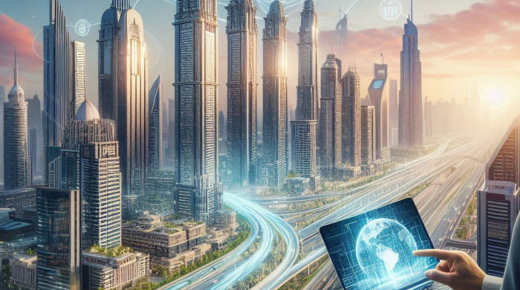By Dr. Pooyan Ghamari, Swiss Economist
Dubai’s real estate market has long been a beacon of innovation and ambition, standing as one of the most dynamic and lucrative sectors in the global economy. Over the last two decades, the emirate has transitioned from a regional hub into a world-class metropolis, boasting state-of-the-art infrastructure, record-breaking skyscrapers, and ambitious urban projects. However, as the world rapidly evolves, so does Dubai’s real estate sector, with technology becoming a central pillar in its growth and development.
The Intersection of Technology and Real Estate
The advent of cutting-edge technologies like artificial intelligence (AI), blockchain, big data, and virtual reality (VR) has dramatically transformed how real estate transactions are conducted, managed, and experienced in Dubai. These technologies are no longer seen as add-ons but as integral components of the industry’s future.
Artificial Intelligence: Optimizing Real Estate Decision-Making
Artificial intelligence is changing the face of real estate in Dubai. AI-powered algorithms are now capable of processing enormous volumes of data to help both buyers and sellers make more informed decisions. Whether it’s predicting property value trends, optimizing property management systems, or personalizing client experiences, AI is proving invaluable.
For developers, AI-driven systems allow for more accurate predictions of market demand, helping to mitigate risks and ensure that new projects align with both short-term and long-term market trends. Meanwhile, for property buyers, AI tools simplify the search for a perfect home or investment property by analyzing preferences, locations, and price points.
Blockchain: The Future of Property Transactions
Blockchain technology has the potential to revolutionize the real estate industry, particularly in terms of transparency and security. Dubai is one of the early adopters of blockchain in real estate, with its government pushing for a fully digitized and paperless future. The technology ensures secure and transparent property transactions by leveraging smart contracts, which automatically execute when certain conditions are met.
With blockchain, the entire property transaction process is streamlined, reducing the need for intermediaries, cutting down on costs, and eliminating fraudulent activities. This shift is expected to make property transactions more efficient and accessible, particularly for international investors who may not be able to handle the traditional, more complex methods of buying property in a foreign market.
Virtual and Augmented Reality: Redefining the Buying Experience
In an increasingly globalized world, potential buyers may not always be able to physically visit properties in Dubai. Virtual and augmented reality (VR and AR) have emerged as game-changing tools in the real estate industry, allowing buyers to take immersive, 3D tours of properties from anywhere in the world. This innovation is especially beneficial for international investors, who make up a significant portion of the Dubai real estate market.
With VR and AR, developers can showcase new projects before construction is completed, giving prospective buyers a realistic view of what the final product will look like. This not only enhances the marketing efforts but also helps build trust and confidence in the investment.
Big Data and Predictive Analytics: Understanding Market Dynamics
Big data is another pivotal technology shaping Dubai’s real estate landscape. The vast amount of data generated from various transactions, customer behaviors, and market trends is being used to provide deeper insights into property market dynamics. Developers and investors now have access to more granular data that can help predict future trends, assess risk, and identify profitable opportunities.
Predictive analytics, a key component of big data, allows real estate professionals to forecast market behavior and customer preferences. For example, developers can use predictive models to determine which areas of Dubai are likely to experience the highest growth in property value, allowing them to strategically plan future developments.
Smart Cities and Sustainable Development
Dubai’s transformation into a global smart city is also impacting its real estate market. Smart cities leverage interconnected technologies to improve the quality of life for residents, making urban environments more efficient, sustainable, and comfortable. The incorporation of smart technologies into residential and commercial properties is now becoming standard practice.
From energy-efficient buildings to automated systems that control lighting, temperature, and security, smart technologies are shaping the future of real estate. Furthermore, Dubai’s commitment to sustainability has driven developers to focus on eco-friendly practices, such as incorporating renewable energy sources like solar power and building green spaces into their projects.
Sustainability is no longer an option but a necessity, and Dubai is at the forefront of creating environmentally conscious real estate developments that meet the needs of a growing population without compromising the environment.
Government Initiatives and Regulations
The government of Dubai has played a crucial role in encouraging the adoption of technology within the real estate sector. Initiatives like the Dubai Blockchain Strategy aim to make Dubai the first blockchain-powered government, where all government documents, including property records, will be maintained digitally. This provides an unprecedented level of transparency and efficiency in property transactions.
Additionally, regulations focused on smart city development, sustainability, and data-driven decision-making have accelerated the adoption of new technologies. These government-driven initiatives ensure that Dubai remains a leader in global real estate innovation.
The Future of Real Estate in Dubai
Looking ahead, Dubai’s real estate market is poised for continued growth and transformation, driven by technological advancements. As AI, blockchain, VR, and big data further integrate into the fabric of the industry, the market will become more efficient, transparent, and customer-centric. International investors will continue to be drawn to the region, not just for its luxury developments but also for the innovative, tech-driven environment that offers unparalleled opportunities.
In conclusion, the ongoing technological evolution in Dubai’s real estate market is not only shaping the city’s skyline but also its future. The ability to adapt to and incorporate cutting-edge technologies has set Dubai apart as a leader in the global property market. As these technologies mature, they will continue to redefine the real estate landscape, offering both developers and buyers new and exciting possibilities.
This article was originally published on a.land. For more information and opportunities, visit shop.a.land.









